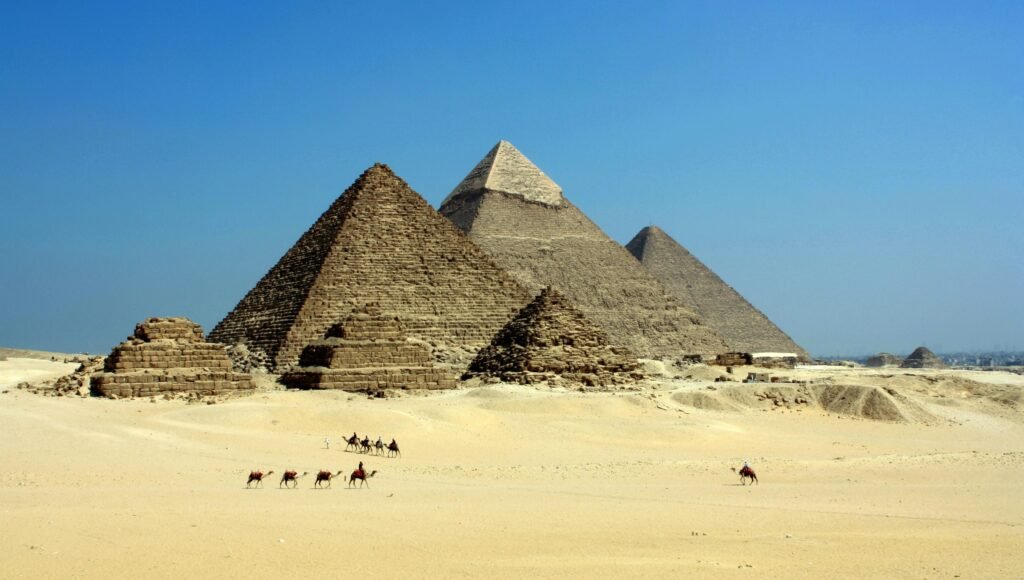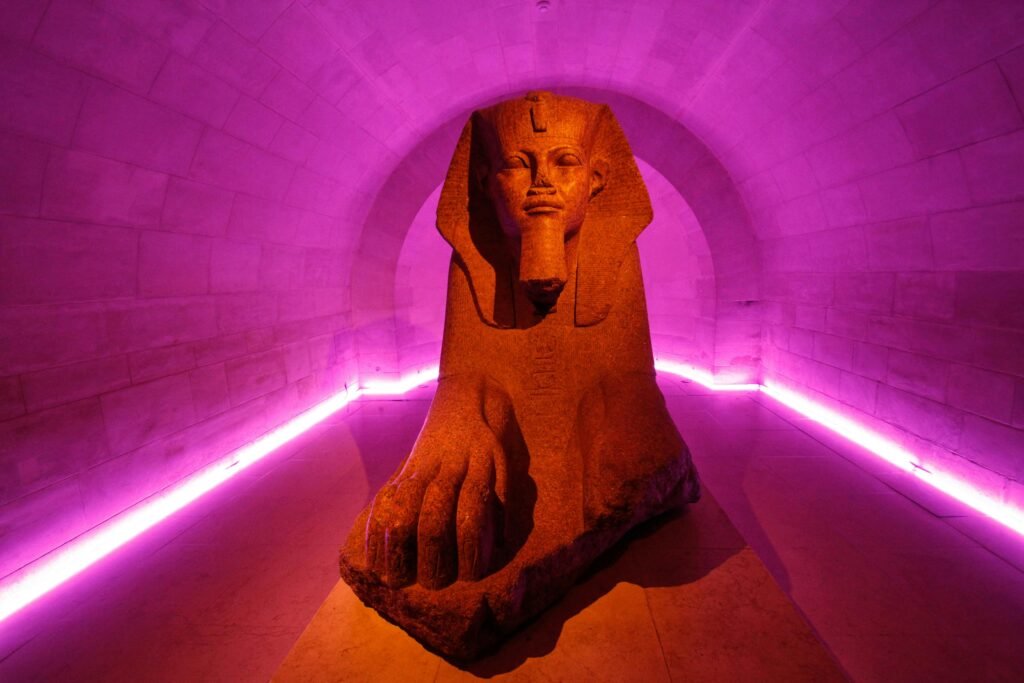Introduction to Egypt: A Land of Wonders
Egypt, often referred to as the cradle of civilization, is a country that seamlessly blends the remnants of its ancient past with the vibrancy of modern life. The allure of Egypt lies primarily in its historic sites, many of which are considered among the most remarkable on Earth. From the awe-inspiring Pyramids of Giza, which have stood the test of time for over 4,500 years, to the intricate carvings and massive columns of the temples at Luxor, the nation is steeped in a rich tapestry of history that captivates millions of visitors annually.
The Pyramids of Giza, one of the Seven Wonders of the Ancient World, draw travelers from all corners of the globe eager to witness the architectural magnificence that symbolizes the innovative spirit of the ancient Egyptians. Not only are these structures a testament to the ingenuity of the civilization that built them, but they also serve as a portal into a world where pharaohs ruled and the Nile was revered as a life-giving force. Luxor, often called the world’s greatest open-air museum, offers an abundance of temples and tombs, showcasing the grandeur of ancient Egyptian art and philosophy.

Planning Your Itinerary: Key Destinations
For first-time visitors to Egypt, crafting an itinerary that encompasses both ancient wonders and modern attractions is paramount. A well-structured plan will ensure that travelers experience the vibrant history and cultural richness that this magnificent country has to offer. Starting in Cairo, the Pyramids of Giza stand as one of the most iconic symbols of Egypt. The Great Pyramid, built for Pharaoh Khufu, is a marvel of engineering and a UNESCO World Heritage site. A visit typically requires at least half a day to fully appreciate the three pyramids and their surrounding complex.
Not far from the Pyramids, the Sphinx captivates travelers with its enigmatic presence. This majestic statue, believed to embody the pharaoh Khafre, is best experienced early in the morning to avoid crowds. Allocating 1-2 hours for viewing and photography is advisable. Following up with Cairo’s Egyptian Museum will enrich your understanding of Ancient Egypt, showcasing a multitude of artifacts, including treasures from Tutankhamun’s tomb. A guided tour can enhance this experience, taking about 2-3 hours.
After immersing in the bustling life of Cairo, a trip to Luxor is essential. This city is a treasure trove of pharaonic tombs and temples, particularly the Karnak Temple, considered one of the largest religious complexes in the world. Visitors should plan for a full day to explore its vast area and stunning temples. Just a short distance away lies the Valley of the Kings, where tombs of ancient pharaohs, including Tutankhamun, can be found. Allocate at least half a day for this historical site, as it provides deep insights into Egyptian burial practices.
By including these key destinations in your itinerary, you will be able to capture the essence of Egypt’s ancient heritage while allowing sufficient time to soak in its modern vibrancy. Each site offers unique experiences and narratives that contribute to a fulfilling journey through Egypt.
Exploring Cairo: The Gateway to Ancient Egypt
Cairo, the vibrant capital of Egypt, serves as the gateway to both ancient treasures and contemporary urban life. With a population of over 9 million, it is a bustling metropolis where history and modernity coexist. Visitors embarking on their journey through Egypt will find that Cairo is ideally situated close to iconic landmarks, including the Pyramids of Giza and the Sphinx, making it a perfect starting point for exploring the nation’s rich heritage.
Among the most significant attractions in Cairo is the Egyptian Museum, which houses an extensive collection of ancient artifacts. This world-renowned museum features an unparalleled assortment of mummies, sculptures, and relics from Egypt’s pharaonic past, including the stunning treasures of Tutankhamun. To truly appreciate these extraordinary exhibits, it is advisable to allocate several hours to explore the museum, and guided tours are available for those who wish to gain deeper insights into the artifacts on display.
Another must-visit location in Cairo is the Khan el-Khalili souk, a bustling bazaar that epitomizes the lively spirit of the city. This historic market is famous for its vibrant atmosphere and an array of goods, from spices to handcrafted jewelry. Visitors to the souk should take their time to wander through its winding alleys, where the aroma of traditional Egyptian street food wafts through the air. Must-try dishes include koshari, a comforting mix of rice, lentils, and pasta, as well as fresh falafel served with tahini sauce.
To navigate Cairo efficiently, travelers can use a combination of taxis, ride-hailing apps, and the metro system. While taxis are widely available, it is recommended to agree on a fare before the journey begins. The metro, although limited in coverage, is a quick and inexpensive way to reach various districts of the city. Overall, Cairo’s blend of historical significance and modern conveniences make it an essential destination for all first-time visitors to Egypt.
The Majestic Pyramids of Giza: A Step Back in Time
The Pyramids of Giza are among the most iconic symbols of ancient Egypt and stand as a testament to the remarkable achievements of the civilization that once dominated the Nile Valley. Constructed over 4,500 years ago, these monumental structures served as tombs for pharaohs and are rich in historical significance. The Great Pyramid of Khufu, the largest of the three, is considered one of the Seven Wonders of the Ancient World and continues to inspire awe with its precise alignment and massive scale.
Visiting the Pyramids is an essential experience for first-timers in Egypt. The best times to explore this archaeological wonder are during the early morning or late afternoon, as these periods offer cooler temperatures and softer light, which enhances the visual splendor of the monuments. Engaging guided tours provide invaluable insights into the history, architectural innovations, and cultural relevance of the pyramids. Knowledgeable guides can enlighten visitors about the construction techniques and the labor force behind these remarkable edifices, transforming a simple visit into an enlightening educational experience.
For those seeking a different perspective, camel rides allow visitors to experience the Pyramids from a unique vantage point, creating a memorable adventure through the desert landscape. As tourists sit atop these majestic animals, they can appreciate the vastness of Giza’s plateau while absorbing the atmosphere that envelops these timeless structures. Likewise, photography enthusiasts will find endless opportunities for capturing the Pyramids against the backdrop of the desert and the setting sun.
Ultimately, the Pyramids of Giza offer an intimate glimpse into ancient Egypt’s grandeur. Whether through a guided tour or a serene camel ride, visitors will undoubtedly leave with a deeper appreciation for this extraordinary site and its enduring legacy in history.
Cruising the Nile: A Unique Perspective
A cruise along the Nile River offers a remarkable opportunity to experience the beauty and history of Egypt from a unique vantage point. This iconic waterway is not only the lifeblood of the country but is also home to numerous ancient civilizations. Various Nile cruise options cater to a range of preferences and budgets, from luxury cruises that provide opulent amenities to more modest vessels that still deliver a rich experience. Each option allows travelers to unwind as they glide past stunning landscapes, archaeological sites, and traditional villages.
Popular itineraries typically range from three to seven nights and provide an in-depth exploration of significant historical landmarks. Travelers can expect to visit notable sites such as the Valley of the Kings, the Temple of Karnak in Luxor, and the ancient temples of Edfu and Kom Ombo. Each stop offers guided tours that delve into the storied past of these locations, enhancing the overall cruise experience. Additionally, passengers will find that sailing from Aswan to Luxor or vice versa provides ample opportunities to witness daily life along the river, with local fishermen, farmers, and children playing along the banks.
Onboard, cruises often include meals that showcase Egyptian cuisine, allowing guests to savor traditional dishes while surrounded by breathtaking views. Dining experiences are complemented by live entertainment, such as music and dance performances that highlight Egypt’s rich cultural heritage. Travelers can engage with crew members and fellow passengers, creating a communal atmosphere that fosters cultural exchange. Ultimately, a Nile cruise enriches one’s understanding of both ancient and modern Egypt, making it an essential component of any first-time visitor’s itinerary.

Luxor and Aswan: The Heart of Ancient Egypt
Luxor and Aswan, often regarded as the core of ancient Egypt, offer travelers a profound glimpse into the rich history and culture of one of the world’s oldest civilizations. Luxor, known as Thebes in ancient times, is home to some of the most significant archaeological treasures, including the infamous Valley of the Kings, where the tombs of ancient pharaohs are located. Here, visitors can explore the final resting places of rulers such as Tutankhamun and Ramses VI, each adorned with elaborate hieroglyphics and breathtaking artworks. The historical significance of this site cannot be overstated, as it reveals insights into the burial practices and beliefs of the ancient Egyptians.
In addition to the Valley of the Kings, the Colossi of Memnon stands as an impressive testament to ancient artistry. These two massive stone statues of Pharaoh Amenhotep III are reminiscent of the grandeur of ancient Egypt. Their sheer size and historical context captivate visitors and prompt reflections on the civilization that once thrived in this region. Moreover, travelers can engage with local customs, such as traditional crafts and cuisine, enhancing their understanding of modern Egyptian culture intertwined with its ancient roots.
Aswan, located further south along the Nile, offers a more tranquil atmosphere. The city is known for its stunning ancient sites, such as the Temple of Philae, dedicated to the goddess Isis. Visitors can reach the temple by a short boat ride, providing a serene experience amidst the bustling life of the Nile. Furthermore, the Nubian culture prevalent in Aswan enriches the visitor experience. Engaging with local Nubian communities, enjoying traditional music, and sampling regional dishes can profoundly enhance one’s appreciation for the area.
In conclusion, both Luxor and Aswan serve as extraordinary destinations for first-time travelers to Egypt. They offer remarkable insights into the grandeur of ancient Egypt while simultaneously highlighting the enduring cultural heritage that continues to flourish in these cities today.
Navigating Local Customs and Etiquette
When visiting Egypt, understanding local customs and etiquette is crucial to ensure respectful interactions and enrich your experience in this vibrant country. Dress codes play a significant role in Egyptian culture, particularly when visiting religious sites such as mosques and temples. It’s advisable to wear modest clothing that covers shoulders and knees. For women, a scarf may be required to cover the hair when entering sacred places. Men should avoid shorts in such settings to show deference to local traditions.
In everyday life, greeting customs can be intricate. A typical greeting involves a smile and a firm handshake, which is followed by asking about one’s health in a friendly manner. Familiarize yourself with basic Arabic phrases to foster goodwill, such as “Marhaban” (hello) and “Shukran” (thank you). Using these phrases will not only help you navigate interactions but also demonstrate respect for the local language and culture. Furthermore, try to be aware of the nuances of conversations; for instance, personal space is generally more respected in Egyptian culture than in some Western societies.

Dining customs are also noteworthy; it is common practice to eat with your right hand, as the left hand is considered unclean. If you are invited to a local’s home, bringing a small gift, such as sweets or fruit, is a thoughtful gesture. When dining out, it is customary to leave a tip, generally around 10% of the bill, as a sign of appreciation for good service. Engaging with locals and observing their customs will enhance your experience and contribute to positive interactions. Being mindful of such practices ensures travelers can enjoy the rich tapestry of Egypt’s ancient and modern life while showing respect to its people. In conclusion, adhering to local customs and etiquette not only helps avoid misunderstandings but also enriches your overall experience in this historically significant country.
Practical Tips: Transportation, Safety, and More
Traveling to Egypt can be a remarkable experience, but to fully appreciate both the ancient wonders and modern conveniences, it is essential to be aware of a few practical considerations regarding transportation, safety, currency, and health recommendations.
When it comes to transportation, Egypt offers various options for moving around. In major cities like Cairo and Alexandria, ride-hailing services such as Uber or local equivalents can provide affordable and convenient travel. For long distances, consider using trains, which can be an economical choice to reach cities such as Luxor and Aswan. Alternatively, domestic flights are available for travelers looking to save time. Be mindful of traffic conditions in urban areas, as they can be congested, particularly during peak hours.
Currency in Egypt is the Egyptian Pound (EGP). Credit cards are widely accepted in hotels, restaurants, and shops, but it’s advisable to carry some cash for smaller vendors and markets. ATMs are available in major cities, but confirm with your bank on international withdrawal fees beforehand. Always keep small denominations handy for tips, which are customary in Egyptian culture.
Safety is an important consideration for any traveler. While most visits to Egypt are trouble-free, it is crucial to follow local advice regarding safety. Stay informed by checking travel advisories from your home country. Additionally, be cautious when venturing into less crowded areas and avoid demonstrations or large gatherings. It is also beneficial to know the contact details of your country’s embassy or consulate.
From a health perspective, ensure you are aware of the recommended vaccinations before arrival. Staying hydrated is key, especially in the warmer months, so carry bottled water with you. Tap water is generally not safe to drink, so avoid consuming it to prevent health issues during your stay.
By keeping these practical tips in mind, first-time travelers to Egypt will find their experience enriched, allowing them to focus on exploring the rich historical and cultural offerings of this fascinating destination.
Conclusion: Embracing the Egyptian Experience
Visiting Egypt offers a unique blend of ancient history and modern vibrancy, making it a destination like no other. As travelers set foot on this remarkable land, they are not only greeted by the majestic pyramids and the serene Nile but also by bustling cities alive with contemporary culture. Embracing the full spectrum of experiences that Egypt offers is essential for first-time visitors looking to create lasting memories.
Throughout this blog, we have explored the significance of Egypt’s ancient monuments, such as the Great Sphinx and the Temple of Karnak, which tell the stories of a civilization that has influenced countless generations. However, the journey through Egypt does not stop at its historical attractions. One must also delve into the lively atmosphere of cities like Cairo, where cafés buzz with energy, and local markets offer an array of souvenirs representing traditional craftsmanship.
Moreover, the warm hospitality of the Egyptian people enhances the travel experience, enabling visitors to connect with the culture on a personal level. Engaging with locals, trying authentic Egyptian cuisine, and participating in cultural festivities can provide deeper insights into daily life in this fascinating country. Whether exploring the relics of the past or embracing the innovations of the present, travelers have an opportunity to create a well-rounded journey.
Ultimately, the allure of Egypt lies in its ability to transport visitors through time. The remarkable juxtaposition of ancient wonders alongside urban development encapsulates the spirit of this nation. Therefore, as you prepare for your adventure in Egypt, remember to fully immerse yourself in both the ancient and modern facets, creating an enriching travel experience that will resonate long after you return home.






